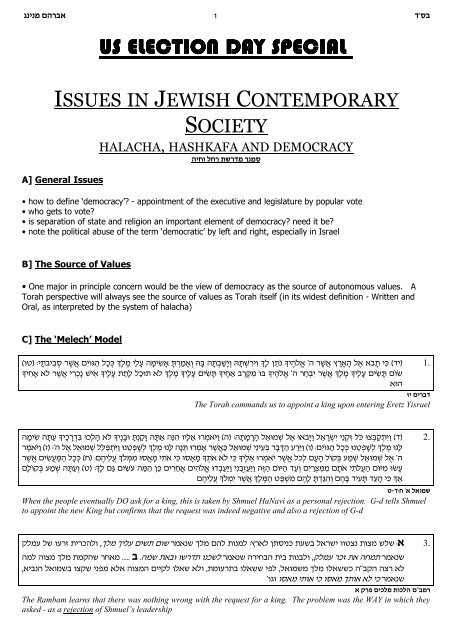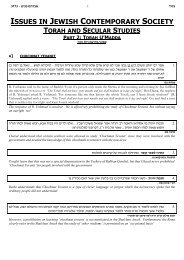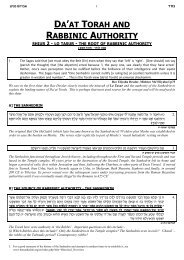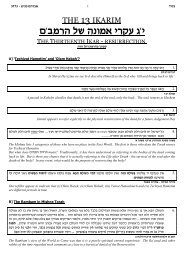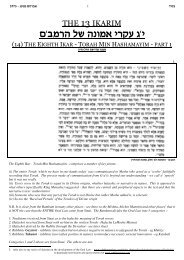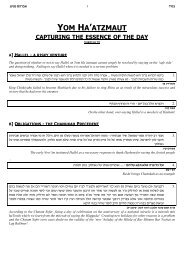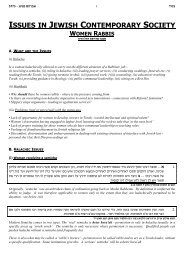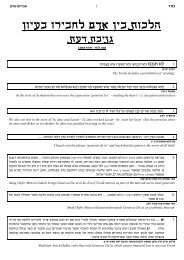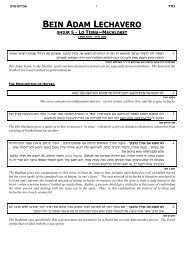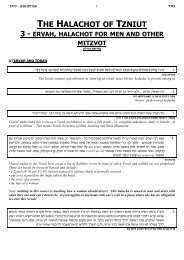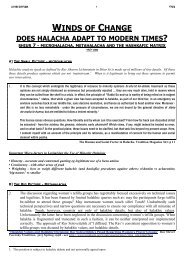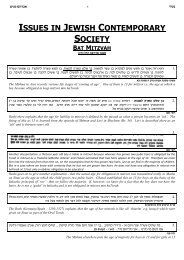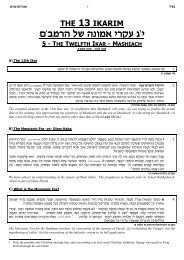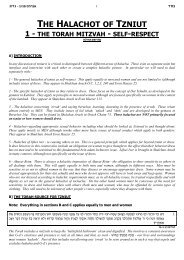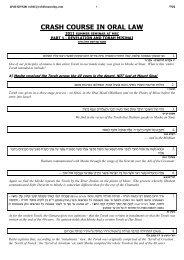Halacha and Democracy - Rabbi Anthony Manning
Halacha and Democracy - Rabbi Anthony Manning
Halacha and Democracy - Rabbi Anthony Manning
- No tags were found...
You also want an ePaper? Increase the reach of your titles
YUMPU automatically turns print PDFs into web optimized ePapers that Google loves.
dbhbn ovrct<br />
1<br />
US ELECTION DAY SPECIAL<br />
sxc<br />
ISSUES IN JEWISH CONTEMPORARY<br />
SOCIETY<br />
HALACHA, HASHKAFA AND DEMOCRACY<br />
vhju kjr ,arsn rbnx<br />
A] General Issues<br />
• how to define ‘democracy’ - appointment of the executive <strong>and</strong> legislature by popular vote<br />
• who gets to vote<br />
• is separation of state <strong>and</strong> religion an important element of democracy need it be<br />
• note the political abuse of the term ‘democratic’ by left <strong>and</strong> right, especially in Israel<br />
B] The Source of Values<br />
• One major in principle concern would be the view of democracy as the source of autonomous values. A<br />
Torah perspective will always see the source of values as Torah itself (in its widest definition - Written <strong>and</strong><br />
Oral, as interpreted by the system of halacha)<br />
C] The ‘Melech’ Model<br />
(uy) :h ,«ch c x r Jt oh«uD v kf F Qk n hkg v nh G t T r<br />
n t u VC v T c Jh u V T J rh u Qk i ,«b Wh v«kt wv r Jt . r<br />
t v k t t«c , h F (sh) 1.<br />
Wh j t t«k r Jt hr<br />
fb Jh t Whkg , ,k kfU, t«k Qk n Whkg oh G T Wh j t cr<br />
E n «uC Wh v«kt wv r j ch r Jt Qk n Whkg oh G T o«uG<br />
tUv<br />
zh ohrcs<br />
The Torah comm<strong>and</strong>s us to appoint a king upon entering Eretz Yisrael<br />
v nh G v Tg Whf r<br />
s<br />
C Ufk v t«k WhbcU Tb ez v T t vB v uhk t Ur nt«Hu (v) :v , n r<br />
v k tUn J k t Ut«cHu k t r<br />
Gh hb ez k«F Um C e ,Hu (s)<br />
r nt«Hu (z) :wv k t k tUn J kK P ,Hu Ub y p Jk Qk n UbK vb T Ur n t r Jt F k tUn J hbhg C rc S v g rHu (u) :oh«uD v kf F Ub y p Jk Qk n UbK<br />
r Jt oh Gg N v kf F (j) :o vhkg Q«k N n Uxt n h ,«t h F Ux t n W ,«t t«k h F Whk t Ur nt«h r Jt k«fk og v k«ue C g n J k tUn J k t wv<br />
ok«ue C g n J v Tg u (y) :Qk oD oh G«g v N v iF ohr<br />
jt oh v«kt Us c gHu hb czgHu vZ v o«uH v sg u oh r<br />
m N n o ,«t h ,«kg v o«uH n UGg<br />
o vhkg Q«k nh r Jt Qk N v y P J n o vk T sD v u o vC sh g T sg v h F Q t<br />
y-s:j wt ktuna<br />
When the people eventually DO ask for a king, this is taken by Shmuel HaNavi as a personal rejection. G-d tells Shmuel<br />
to appoint the new King but confirms that the request was indeed negative <strong>and</strong> also a rejection of G-d<br />
2.<br />
ekng ka ugrz ,hrfvku 'lkn lhkg oha, oua rntba lkn ovk ,ubnk :.rtk i,xhbf ,gac ktrah uuymb ,umn aka :t<br />
rntba vrhjcv ,hc ,ubcku 'ekng rfz ,t vjn, rntba<br />
vnk vumn lkn ,neva rjtn ///// c /vna ,tcu uars, ubfak<br />
'thcbv ktunac umea hbpn tkt vumnv ohhek ukta tku ',nugr,c uktaa hpk 'ktunan lkn uktaaf v"cev vmr tk<br />
wudu uxtn h,ut hf uxtn l,ut tk hf rntba<br />
t erp ohfkn ,ufkv o"cnr<br />
The Rambam learns that there was nothing wrong with the request for a king. The problem was the WAY in which they<br />
asked - as a rejection of Shmuel’s leadership<br />
3.
dbhbn ovrct<br />
2<br />
sxc<br />
4.<br />
th aurs i"rv ,uars<br />
The Ran (Spain 14C) underst<strong>and</strong>s that there need to be two separate structures of leadership in society - (i) executive<br />
leadership by the king according to societal laws <strong>and</strong> (ii) religious leadership by the Beit Din according to Torah laws.<br />
The mistake of the people was to ask for a system which combined leadership in the king alone<br />
vz ihta gnanc whv vz iuak hpk ift /vnusfu rac vkfut ,rntu iuakf tkt vpc ugnanf vrhnt whpv iht /wudu ,rnt 5.<br />
htnk f"tu 'lkn ,ubnk vumns k"zj hrcsc gush hrvu /wudu rac vkfut ,rntu unf ,uar tkt lkn ,ubnk ykjunc vumn<br />
ahu /ovhrjcbu ogv ,gs h"pg ut vfukn ,gs h"pg dvb,n ot vb,an vbhsnv ,dvbvs ouans vtrbu /wudu ,rntu ch,f<br />
h"pg ,uagk t"t vz rcsu /yhbrce hkc vbhpxf thv hrv lkn tkca vbhsn ahu /vfukn ,gs kucxk vkufh vbhta vbhsn<br />
ykjvc ,uumk rapt tk hfv ouan /vag ,umn vjusa ,uapb ,bfxk gdub kkfv ,dvbvk lhhav ihbgc hrva /g"n jrfv<br />
r,uh rsxc ohdvb,n ovh,uchcx rat ,ubhsn ohtura h"pg lkn kug kucxk ogv ,nfxvc vkg tka inz kf lkn ,ubnk<br />
/lkn ,ubnk ihrsvbxk g"n zt ut /iufb<br />
sh euxp zh erp ohrcs kg rcs engv<br />
The Netziv on the parashat hamelech notes that the mitzvah to appoint a king appears to be somewhat optional ‘if you<br />
decide ...’. Yet we see clearly that this is a mitzvah. He answers that there IS a mitzvah to appoint a government but a<br />
monarchy is only one of the potential options. The ‘flexible’ wording of the mitzvah is to indicate the the people have the<br />
right to choose other forms of government than a king. This all falls under the rubric of ‘melech’<br />
ukt - uhkdr ihcn eejnu /ycac ktrah ,t ihsura 'kccca ,uhkd hatr ukt - vsuvhn yca ruxh tk (yn ,hatrc) :thb,sf 6.<br />
ohcrc vru, ihsnkna 'kkv ka uhbc hbc<br />
/v ihrsvbx<br />
Chazal learn from the Torah that the ‘Reish Geluta’ - the temporal leadership in Bavel - <strong>and</strong> the Sanhedrin have<br />
authority vested in them by the Torah itself. Some wish to read this as indicating that the leadership must remain within<br />
the tribe of Yehuda
dbhbn ovrct<br />
3<br />
sxc<br />
7.<br />
sh:sne ivf ypan eue whwt cr<br />
Rav Kook however underst<strong>and</strong>s this verse to be grant the authority of the ‘king’ to any representative body picked by the<br />
people, even in exile. Even if they are not technically a ‘king’, they have the halachic authority of the ‘melech’. He cites<br />
the Hasmonean rulers as an example.<br />
Note the implications of this approach as the the sacralization of the State <strong>and</strong> the way in we relate to the organs of state<br />
vhv vzu //// 'vkjb ohrhcgnu ovhct ,gs kg ohrcug sus hrjt ohycav rtan ktrah kg ohfkunv ohfknv uhv h,gs hpk 8.<br />
uabgb if hp kg ;tu 'ktrahn ,umnvu vru,v ujf,ab ov tknktu 'iuhkg hshxj uhv hf 'hba ,hcc ufkna ohtbunajv abug<br />
/crjc ovhchut shc ukpb o,jkmvu o,rucd kf og vz rjt vz ohfkunv ohshxjv iezv htbunaj hbc ,gcrt hf 'kusd abug<br />
//// /vzv iugc okf u,rfba 'tuv tscg tbh,te htbunaj ,hcn rnts itn kf (:d c"c) k"zr urnta vnk ;uxc abugv ghdvu<br />
ycav urhxvu 'sus ,hcnu vsuvh grzn uhv tku ufkna vz rucgc tkt urcg tk ehsmv htbunaj vh,,n grz kf kct<br />
ou,hrfv ovu ovhscg ,t ovhkg tuv lurc ausev khanva 'vsn sdbf vsn oabug vhvu 'hrndk eeujnvu<br />
h:yn ,hatrc i"cnr<br />
The Ramban understood that the Hasmoneans were punished for having assumed the trappings of leadership even<br />
though they were not from Yehudah!<br />
9.<br />
uge wng ws ekj kthzug hbnfn<br />
Rav Benzion Uziel - first Sefardi Chief <strong>Rabbi</strong> in Israel <strong>and</strong> colleague of Rav Kook - disagrees with Rav Kook, based on<br />
the Ramban. The current political State of Israel does not have the halachic status of a ‘melech’ but is a necessary<br />
temporary executive. The ‘melech’ will be restored when Mashiach comes<br />
C] The ‘Kehilla’ Model<br />
ibt if tkt !vnf ukhpt ivhkg ukche tkac ot sjt whpt ivhkg ukcheac ot ihnhhe ibt vn /rhgf rhgv hbcn wgcau //// 10.<br />
o,xc ihnhhe<br />
c"vq t ruy sg ;s d erp vkhdn ,fxn hnkaurh sunk,<br />
In the exile, Jewish communities often had a large degree of self-determination. Chazal created the system of the ‘7<br />
town representatives’ who were appointed ‘stam’
dbhbn ovrct<br />
4<br />
sxc<br />
rcs kfk ,uar ovk ah vgca ivaf lfhpk /ruchmv hexg kg jepk o,x ohxbrp vgca ruchmv ovhkg ushngvaf rnukf 11.<br />
hbc kff o,uhvk vua ijf iht vgcan ,ujp kct /whpc vz rcs kg o,ut ushngv tka hp kg ;t /rhgv hbc kf if uag uktf<br />
rhgv hbc in aurhpc ,uar ukyha sg rhgv<br />
zhr, inhx t ekj t"carv ,"ua<br />
The Rashba (Spain 13C) explains that ‘stam’ appointment means that once they have a quorum of 7 they can take any<br />
decision necessary for the running of the town, even if they were not explicitly authorized by the people on that issue. If<br />
they have less than the quorum of 7, they must first consult with the people<br />
kg uagha orj ,rzdn ut 'kvev uagha vnfxvv in inmg thmuvk ihkufh rhgca ohbubhcvn vaka ut ohba ot :,ktaa 12.<br />
'curv rjt ohfkuv 'ohnhfxn kveva ihbg kf kgu /,uyvk ohcr hrjt :vru, vrnt ohcr ka exg kg hf 'gs /rcs oua<br />
jf vhvh ot 'rcs oua kg kvev unhfxh tk okugk 'if tk ots /ohcrv ovhkg unhfxha vn kf ohhek ohfhrm ohshjhvu<br />
,uyvk ohcr hrjt :ohcr ka vnfxv rcs kfc 'vru, vrnt ifk `o,nfxv kyck ohshjhc<br />
v inhx u kkf a"trv ,"ua<br />
The Rosh (Germany 13C) points out that the majority must decide communal affairs <strong>and</strong> individuals cannot exclude<br />
themselves from majority decisions. This is based on the Torah principle of ,uyvk ohcr hrjt<br />
D] Practical Application in Israel<br />
13.<br />
dh wng j-z vbhsnvu vru,v - dumrv wh cr<br />
Rav Isaac Herzog, first Chief <strong>Rabbi</strong> of the State of Israel, is attracted by the division of powers outlined in the Ran above<br />
but is unsure as to whether the two systems could really live side by side. In areas which are ‘halachically neutral’ (are<br />
there such areas) there should be no conflict. But what about issues of conflict with halacha. Rav Herzog states<br />
elsewhere it is clear that the secular authority cannot go against Torah. The Kehilla model certainly would not permit<br />
any breach of halacha. The 'melech’ is also subject to the Torah, although there are areas where he has wider authority<br />
14. Judaism has consistently regarded the sacral <strong>and</strong> mundane as distinct but not disjunct. Pervasive halachic<br />
norms relative to all areas of personal <strong>and</strong> communal existence ....... The ideal polity, then, is one in which<br />
religion <strong>and</strong> state interact ..... The halakhic state is thus ruled jointly .... Given the broad latitude of halakha ....<br />
large tracts of personal <strong>and</strong> communal life - virtually the whole social <strong>and</strong> economic sphere, for instance - are, in<br />
effect, independently ruled by two powers whose wills may .... conflict<br />
Rav Aharon Lichtenstein Religion <strong>and</strong> State A Cohen ed. Contemporary Jewish Religious Thought (NY 1987) pp774-775
dbhbn ovrct<br />
5<br />
sxc<br />
R. Nachum <strong>Rabbi</strong>novitch, current Rosh Yeshiva in Maaleh Adumim, has also written extensively in support of the split<br />
model of leadership proposed by the Ran. 1<br />
E] Democratic Elements in the Halachic System<br />
• Chazal could not enact a gezeirah that majority of the constituents could not follow. Some authorities<br />
explain that a gezeirah requires active acceptance by the majority of the population.<br />
• A minhag can only be established if it is accepted by a majority of people in the locale. R. Moshe Feinstein<br />
writes that when dealing with minhagim that establish rules of society, the majority is not determined strictly<br />
by Torah observant Jews or even Jews. Rather, one looks at the local practice of all people to determine<br />
what the minhag is.<br />
• Chazal state in certain contexts that if there is a question regarding halacha, look <strong>and</strong> see what the people<br />
are doing<br />
F] Voting<br />
Letter of R. Moshe Feinstein 3 October 1984<br />
1. Generally on the issue of religion <strong>and</strong> State in Israel see:<br />
• http://www.gavison-medan.org.il/english/arrangements/ - the Gavison~Medan covenant written by R. Yaacov Medan <strong>and</strong> Prof. Ruth Gavison to<br />
address issues of religious conflicts in the State of Israel<br />
• Halakha <strong>and</strong> <strong>Democracy</strong> - Professor Gerald Blidstein Tradition Vol 32 No 1 Fall 1997


